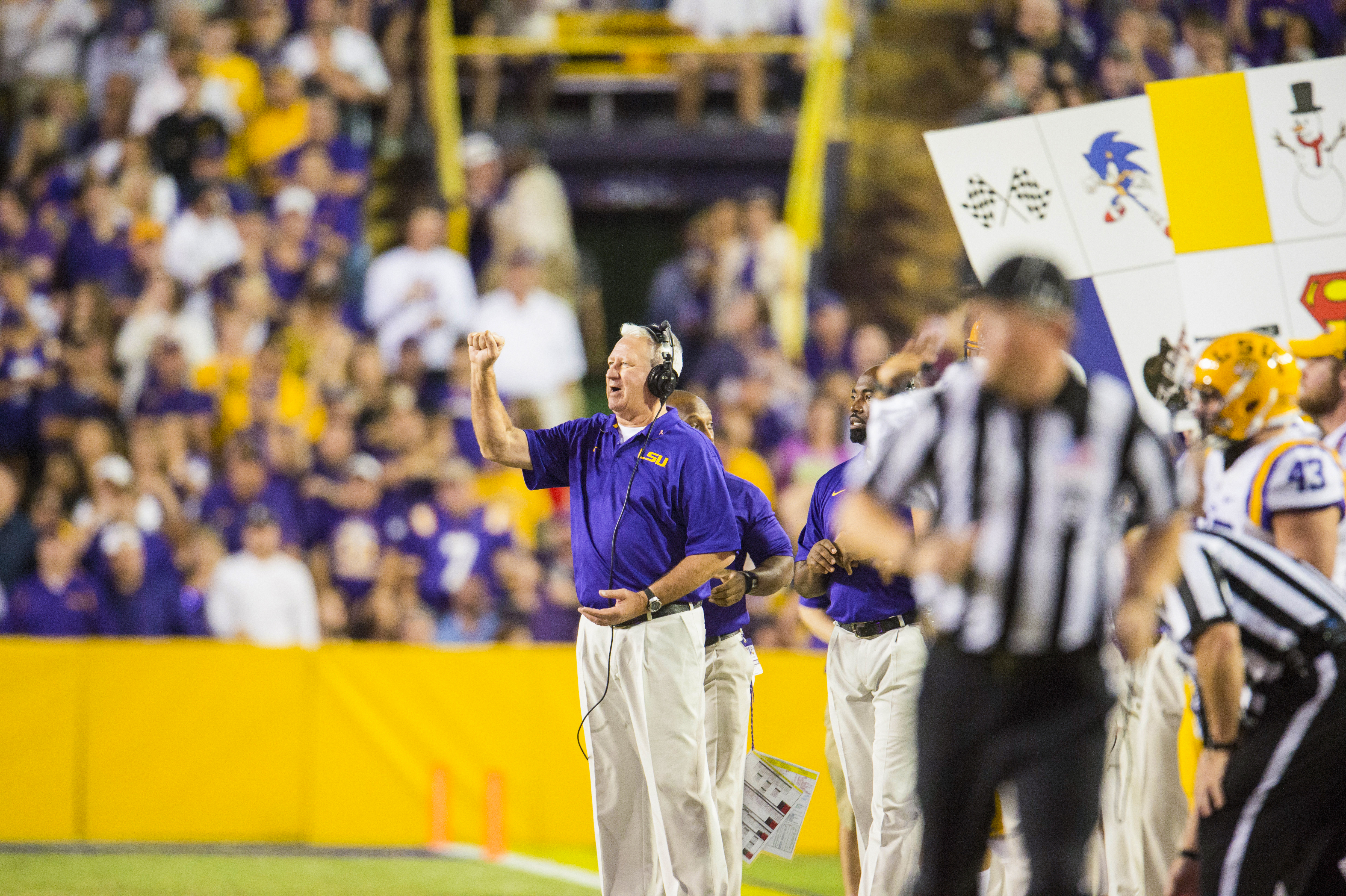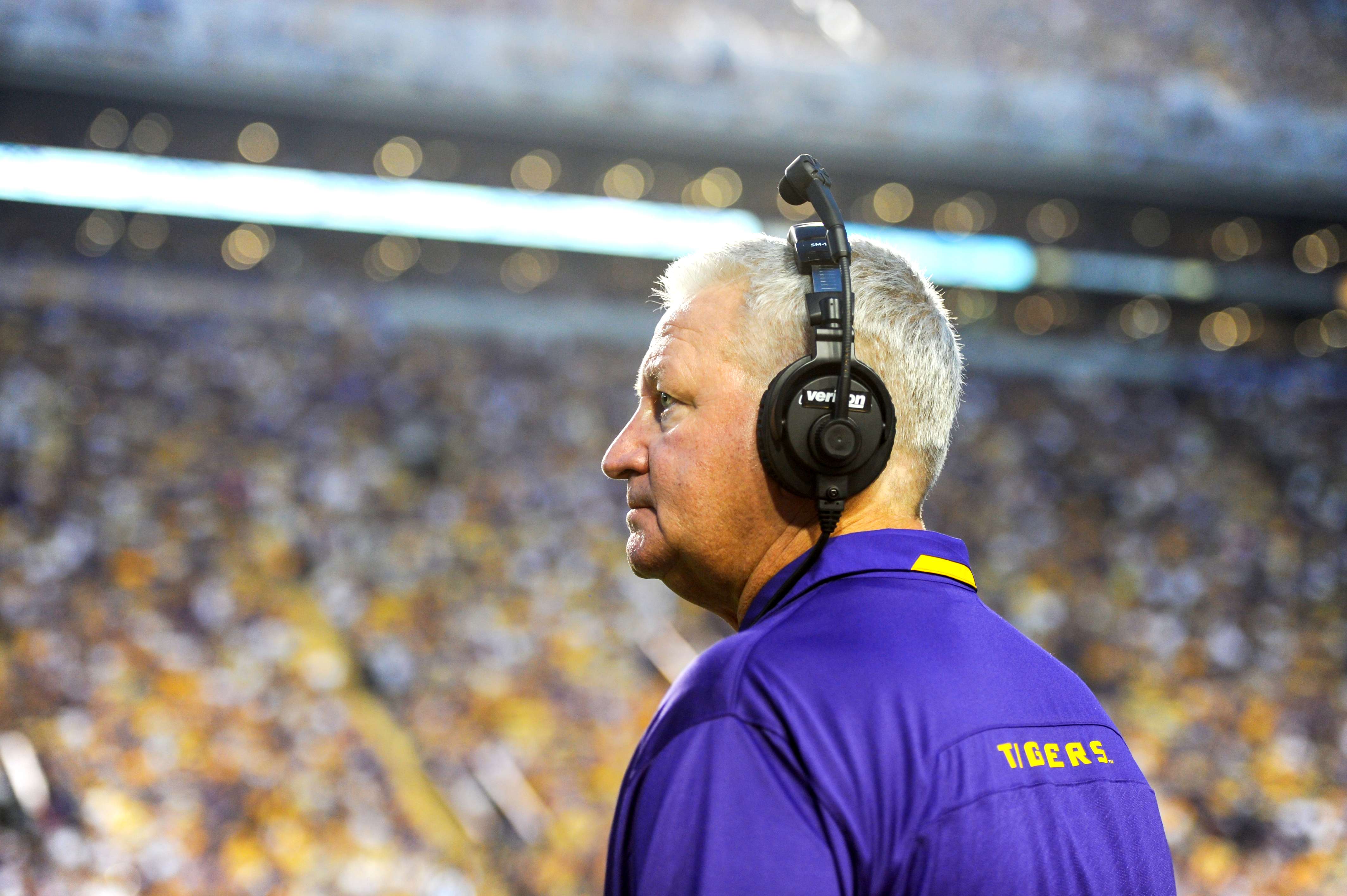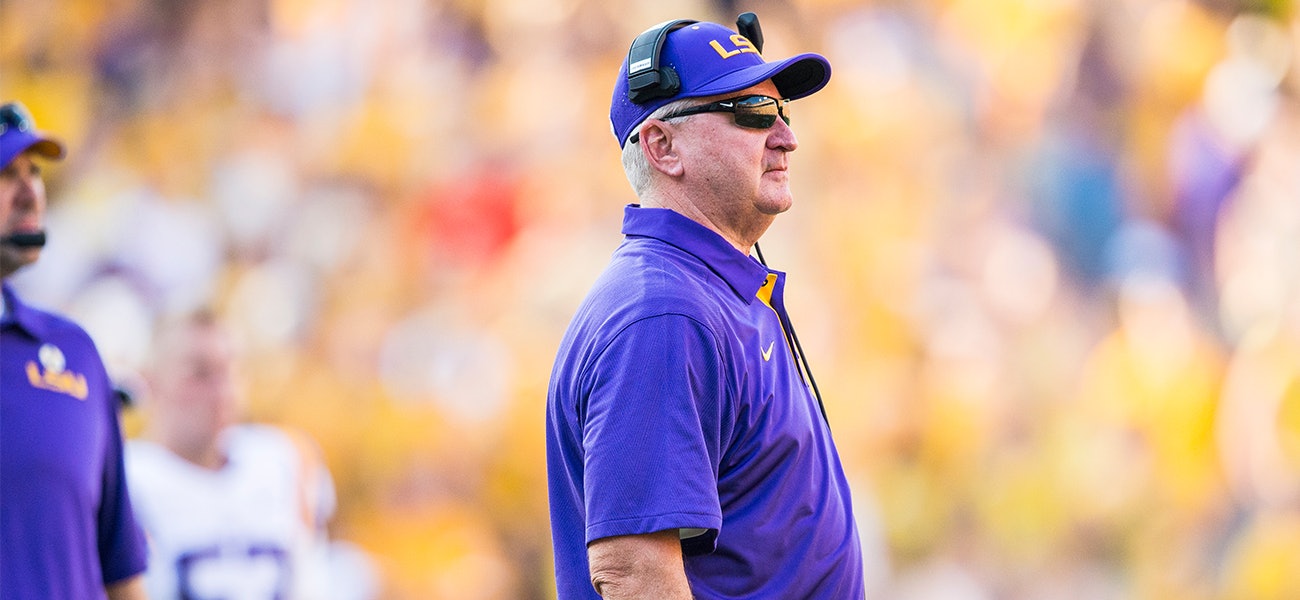One of the first things Ed Orgeron did after being named full-time head coach at LSU was deliver a promise to Tiger fans.
“My plan is to take my time and assemble the best staff in America,” he said in his introductory press conference in 2016. He later added, “We’re going to look at recruiting the best offensive coordinator in football and bring him to LSU.”
If Orgeron lived up to the words he spoke that day, that offensive coordinator was already on campus: tight-ends coach Steve Ensminger.
The former Tiger quarterback joined LSU’s staff in 2010 under then-head coach Les Miles, boasting a strong track record of successful offenses in his career. He’s called plays at six different stops, including Power Five programs such as Clemson, Texas A&M and Auburn.
After only a short time on LSU’s staff, Ensminger was impressive enough that Miles tried to promote him to offensive coordinator entering the 2011 season—just his second year as a Tiger coach. He declined the offer back then.
When Orgeron gave him the same opportunity this go ’round, he felt there was something different.
“I thought it was (the right timing) for the kids,” Ensminger says. “The ones who are on this team right now and this offense have gone through four coordinators. I thought it was fair for them to take it over. I know them all; they know how I am and how I treat them. The only reason I did it—I did it for Coach O, I really did—and I did it for these kids. I thought it’d be too big of a transition not to take it and have them learn [from someone] else.”

You can see the sincerity in his eyes when he says it.
That’s one thing you certainly can’t question with Ensminger: his genuine love for LSU. He cares about his players. He cares about the program. He cares about the community.
So much so that he had to pause 30 seconds into his introductory press conference to fight back tears when talking about his decision to take the job.
“I knew that was gonna happen,” he said as he choked up.
It’s a huge leap for Ensminger. It’ll be his first stint as a full-time offensive coordinator in a decade, and he’s stepping into a spot that has been under the microscope more now than ever before. But he feels his long career has prepared him for the challenge.
And that’s the second thing you can’t question about the Tigers’ new play-caller: He knows the game of football.
Ensminger played for LSU from 1976 to 1979 and has been involved in coaching since 1982. He’s adamant that he doesn’t follow what the press is saying, but he is also fully aware of the pressures that come with being the offensive coordinator in Baton Rouge.
“LSU is different,” Ensminger says. “I know what the expectations are. I don’t have to read social media or Twitter or whatever else to understand that. I don’t read none of that. I don’t read the paper. I don’t. Our coaches come in and say, ‘Hey, did you read this?’ And I say ‘No, I don’t read that stuff. It doesn’t bother me.’”
Despite that—and the fact that he openly hates press conferences—he’s calm and confident during today’s 225 interview at his on-campus office. It’s clear he knows exactly what he wants to do with the offense and has a vision for how they’ll progress this season.
It’s all right there when you walk into his office. Binders, books and DVDs fill his desk and cabinets, containing all the information he’s soaked up throughout the years.
But it’s a very controlled chaos. Everything is labeled appropriately. The binders and their tabs are divided with different formations, schemes, plays, situations or concepts.

He’s on a tight schedule. This afternoon, he keeps his phone out because he’s expecting a call from an important recruit. It does buzz twice, but not for the call he’s waiting for.
It’s yet another reminder of Ensminger’s dedication to the never-ending job. When he’s not scheming, installing or coaching his offense, he’s on the road or the phone recruiting, trying to bring in his type of talent to LSU.
Tiger fans saw a glimpse of what Ensminger brings to the table in 2016, when he was promoted to offensive coordinator on an interim basis following Miles’ firing.
In the four games prior to Ensminger taking over play-calling duties, LSU’s offense averaged 18 points and 339.5 yards per game. In the remaining eight games with Ensminger at the helm—seven of which were conference games—the Tigers posted 32 points and 464.9 yards per game, scoring 38 or more points in five of those contests.
Despite calling plays out of fired offensive coordinator Cam Cameron’s playbook, Ensminger managed to set multiple LSU records that season, including yards in an SEC game (634 against Missouri) and single-game rushing yards broken by both Leonard Fournette and Derrius Guice.
So should LSU fans expect more of the same results in 2018? Yes and no.
“It’ll be somewhat different, there’s no doubt about it,” Ensminger says. “My job as a coordinator and my staff is to evaluate where our talent is and to put the most talented kids we have on the field. For example, in 2016, I had Leonard and Derrius, and they weren’t coming off the field. This year is different. Our job as a staff and my job is to create mismatches … that’s what we’re going to try to do, and what that works out to right now, I don’t know.”
What he does know is the look of the offense will be different than the previous regime.
Ensminger says the strength of this offense lies with the receiving corps, which is littered with four- and five-star prospects. The quarterback competition will be an ongoing battle throughout the fall (see that story on page 42), but no matter who lines up under center, his job will be to get the ball into the hands of his talented supporting cast.

Texas Tech transfer Jonathan Giles has emerged as the leader in that category. The receiver earned the coveted No. 7 jersey for being the most impactful playmaker on the team.
“[The offense] is a lot of balance,” Giles says. “It’s a lot of three-wide, four-wide. Last year was more of a two-receiver set a lot of times with two tight ends. This year, you’ll see more spread and balance and [run-pass options] and things like that—more passing.”
That’s the overall message from anyone you talk to on the offensive side of the ball: more passing. Which sure comes as good news to Tiger fans who have spent the majority of the past decade watching LSU pound the ball down the throat of its opponents with I-formations, jumbo sets and toss-dives.
That’s all going to change this year, if you ask any of the players.
Take senior tight end Foster Moreau, for example. Moreau knows Ensminger as well as anyone on the team, having spent the past three seasons with Ensminger as his position coach.
Moreau has worked under former offensive coordinators Cam Cameron, Matt Canada and interim Ensminger, but he has some high praise for Ensminger in his second stint, now that he’ll be able to install his offense the way he wants it run.
“He’s got his whole playbook now, which is the thing,” Moreau says of Ensminger. “Now he can implement his own offense in the style he wants to do it in, which is really good for him. I can tell from the first day of him getting the job, he was excited to put his spin on it. He’s the best in-game play caller in the country, in my opinion. Coach has been 100% dedicated to getting it implanted into our brain that we can do it right. … We’ve just got to buy in.”
This article was originally published in the Tiger Pride section of the August 2018 issue of 225 Magazine.
Click here to browse the rest of the special LSU section.








